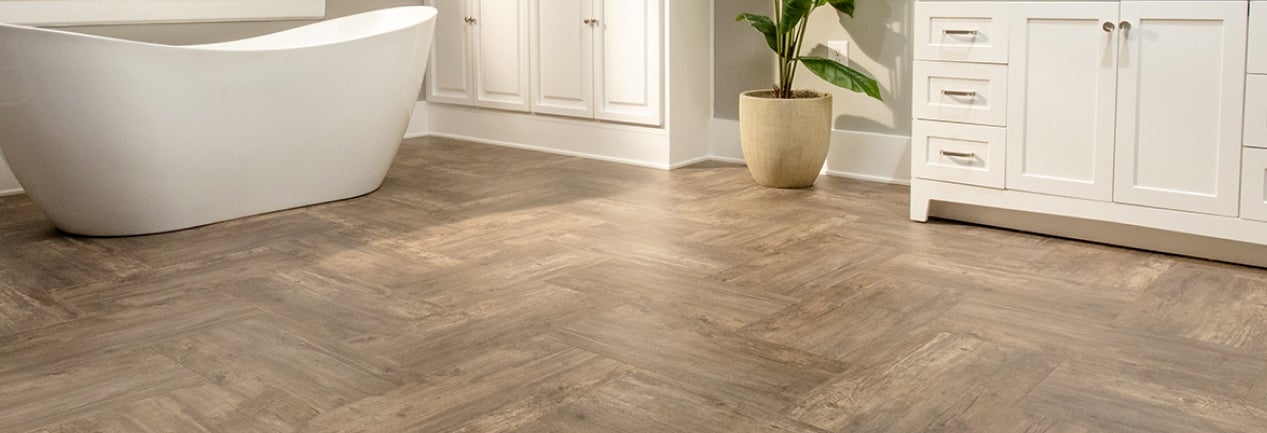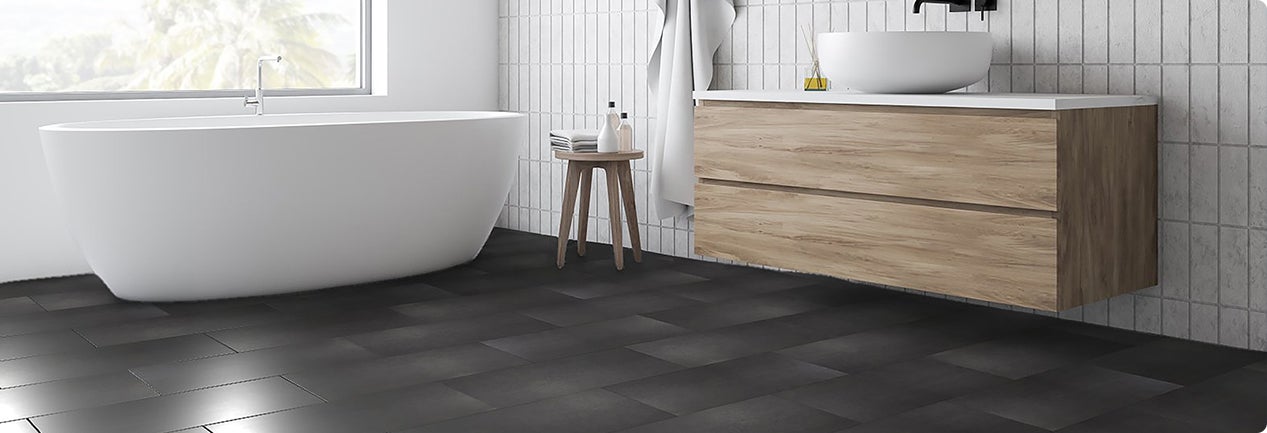
Bathrooms are small spaces where every design decision can make a big impact. And there’s no aspect where that rings truer than with your bathroom flooring. It not only greatly contributes to the overall look of the room, but the floors you choose can also influence how comfortable your bathroom will be and how easy it is to keep clean. If you’re considering a renovation and looking for bathroom flooring ideas, we’re here to help.
Tile
Tile has long been the most popular choice for bathroom flooring, and for good reason. It’s inherently water resistant, one of the most important flooring traits to consider in a room that will regularly be exposed to splashes and high levels of moisture. It’s also easy to maintain. Tile does not trap any contaminants or particles in a way that carpet would and keeping it clean and sanitized is as simple as regularly running a mop over it. Plus, with ceramic and porcelain tiles available in a wide range of neutral, versatile designs, it’s easy to choose a tile floor for your bathroom that will achieve your current style dreams while giving you flexibility with future design revamps.

Engineered Hardwood
While you may dream of turning your bathroom into a rustic retreat, complete with distressed genuine hardwood floors, you’ll have to slightly alter your plans. Real wood is not recommended as a flooring material in bathrooms, because it can easily get damaged by splashes or the prolonged high moisture typical of a bathroom. However, in some situations, you can still achieve your design goals with alternative materials! Empire® carries a wide selection of engineered hardwood floors, which use a top layer of genuine hardwood and a core made from a highly stable composite material. This core is more resistant to moisture than real wood, greatly reducing the chances of warping or buckling. Though still not recommended for full bathrooms, engineered hardwood can be a good choice for half baths that are unlikely to experience lots of splashed or spilled water.
Wood Laminate
When you want the look of real wood but need a material that’s better equipped to handle moisture, wood laminate can be a suitable bathroom flooring choice. Because of its high-density fiberboard core, laminate flooring is more durable than most solid hardwood flooring and isn’t as affected by exposure to water. In fact, some laminate options available from Empire are 100% waterproof, making them an excellent choice for use as bathroom flooring. Plus, you’ll still get the look and even the feel of genuine hardwood floors.

Vinyl
Available in three major form factors—vinyl tiles, vinyl plank, and sheet vinyl—the selection of vinyl flooring available at Empire offers myriad design options to homeowners looking for help with bathroom flooring ideas. One of vinyl’s greatest benefits as a bathroom flooring is its high level of water resistance, with many products also being fully waterproof. Plus, vinyl will typically feel much warmer underfoot than porcelain or ceramic tile.

What to Consider when Choosing Bathroom Floors
When weighing your bathroom flooring options, you’ll want to focus on a different set of features than those you considered for other areas of the home. More than in any other room, the flooring you choose for your bathroom should prioritize a high level of water resistance. On the other hand, you can probably worry less about finding something with maximum resistance to wear or scratching, since your bathroom sees much lighter traffic than, say, a family room or hallway. You may also have to consider comfort a little more than with other rooms.
Ensuring that your bathroom flooring is a good match for your family
As suggested before, the type of bathroom floors you should choose—and how resistant to moisture they need to be—will depend on certain lifestyle habits typical in your home.
- In the home’s main bathroom, where family members bathe or shower, fully waterproof flooring is a must—especially if kids often use the bathroom. Large amounts of water will likely end up on the floor regularly, and floors that are only water-resistant, as opposed to waterproof, may not last long. Perhaps everyone in your family is very careful about drips and splashes, but they enjoy taking long, hot showers. The constantly high humidity in that bathroom makes a compelling case for fully waterproof floors. However, a half-bathroom will experience much less moisture and fewer splashes and could probably get away with flooring that is only water-resistant.
- That main bathroom will probably be used by family members while barefoot or only wearing socks, so a lower priority can be put on scratch resistance or overall wear resistance. But if it’s the bathroom that guests will most often use, you may even want to consider those same features a little more, since visitors may end up in there with their outdoor shoes on. Many homeowners will also place more importance on the aesthetics of the bathroom that guests will use.
- Depending on your climate, you may also want to consider how particular bathroom floors will feel underfoot. Those who live in a cold climate and have ever walked barefoot and half asleep into the bathroom on a cold winter night will understand this best. Porcelain and ceramic tile can be quite the wake-up call in the middle of a chilly night! Materials like laminate or vinyl flooring will feel warmer underfoot, making for more comfortable bathroom visits.
Bathroom Flooring Budget
The bathroom is one of the most common renovation targets in the typical home, and a smartly redone bathroom is often considered a good way to make a home more attractive to potential buyers. But even if you’re not planning on selling your home, a renovated bathroom is a great way to add some new style to your home in a space where it can pay dividends.
Another common reason for redoing a bathroom is that, because they’re usually small rooms, you can often breathe new life into them for a reasonable overall cost—especially compared to a major project like a kitchen renovation. Combining a few major updates, like painting the walls, updating light fixtures, and having new bathroom floors installed can completely change the look and feel of the room without running up a huge price tag.
The limited area also allows homeowners to splurge on higher-end materials that they might not be able to afford for a project that spanned the entire home. If there’s a particular flooring product that you’d love to have installed in your entire home—but a project that big is beyond your budget—limiting it to a bathroom is an affordable way to scratch that particular design itch.
Of course, like any renovation project, the cost of new bathroom flooring can also end up being a higher-than-expected chunk of your budget. Empire is proud to offer high-quality bathroom floors at a wide range of price points, making it easier for homeowners to get the style they seek while staying on budget.
Bathroom Flooring Trends
Your bathroom is a highly personal space, a room where begin and finish your day. Good bathroom design can create a calming, serene environment, turning a small room into an oasis of rejuvenation. And your bathroom floors will play a major part in creating that atmosphere.
Natural aesthetics and textures
One of the most popular interior design trends today is the growing adoption of organic, natural textures and aesthetics. You’ll see this often in kitchens, and it can easily extend to the bathroom as well. Elsewhere in the home, you might opt for genuine wood floors to embrace this style, but as we learned above, real wood and bathrooms don’t mix. Instead, consider wood-look vinyl or laminate floors to take advantage of this look without adding unnecessary worry to your life. Add in a plant that tolerates low light and high humidity and transform your bathroom into a mini oasis.

Vibrant colors and bold patterns
Big, bold design is having a big moment these days as maximalism finds its way back into home design. Think vibrant colors, funky patterns, and anything that injects some personality into a room. This can work great in the bathroom, a space that is often difficult to truly customize because of the limited floor and wall area to work with. Picking bold flooring—whether that’s laminate flooring installed in a unique pattern or simply selecting a brightly colored tile instead of the typical white—is a surefire way to add some punch to the room.
.jpg?language=en)
Learn More
Though they’re usually small rooms, choosing bathroom flooring can still be a big decision. From ideal aesthetics to the important technical specifications you should be aware of, there are a wealth of factors to consider. For added inspiration and education, head to the Empire Today Blog to learn more about what to look for in your next bathroom floor.
